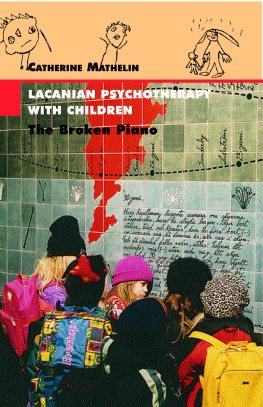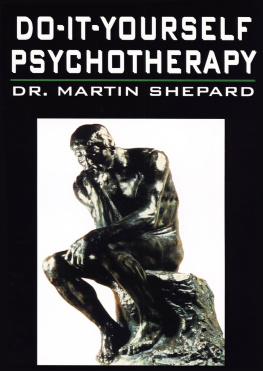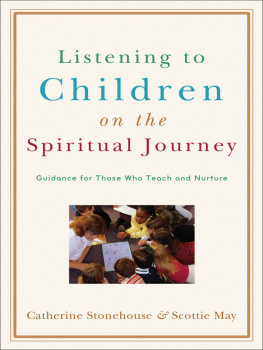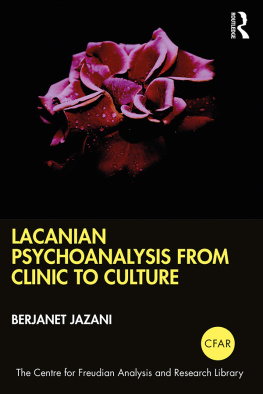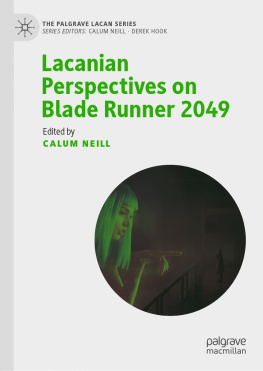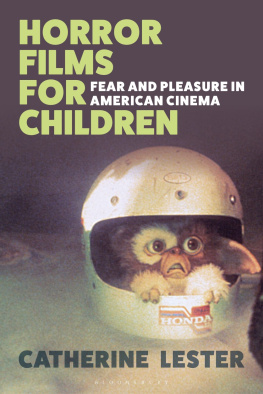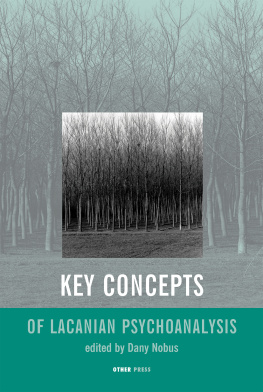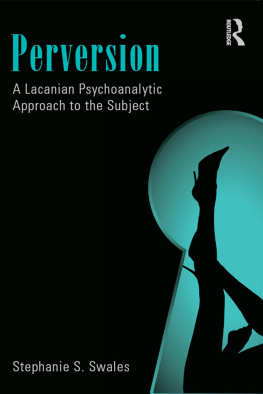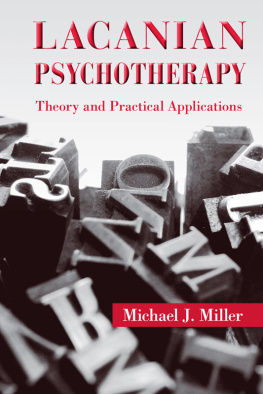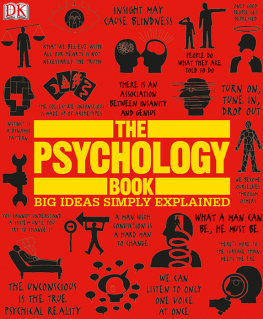Catherine Mathelin - Lacanian Psychotherapy With Children
Here you can read online Catherine Mathelin - Lacanian Psychotherapy With Children full text of the book (entire story) in english for free. Download pdf and epub, get meaning, cover and reviews about this ebook. year: 2020, publisher: Other Press, genre: Children. Description of the work, (preface) as well as reviews are available. Best literature library LitArk.com created for fans of good reading and offers a wide selection of genres:
Romance novel
Science fiction
Adventure
Detective
Science
History
Home and family
Prose
Art
Politics
Computer
Non-fiction
Religion
Business
Children
Humor
Choose a favorite category and find really read worthwhile books. Enjoy immersion in the world of imagination, feel the emotions of the characters or learn something new for yourself, make an fascinating discovery.
- Book:Lacanian Psychotherapy With Children
- Author:
- Publisher:Other Press
- Genre:
- Year:2020
- Rating:5 / 5
- Favourites:Add to favourites
- Your mark:
- 100
- 1
- 2
- 3
- 4
- 5
Lacanian Psychotherapy With Children: summary, description and annotation
We offer to read an annotation, description, summary or preface (depends on what the author of the book "Lacanian Psychotherapy With Children" wrote himself). If you haven't found the necessary information about the book — write in the comments, we will try to find it.
Lacanian Psychotherapy With Children — read online for free the complete book (whole text) full work
Below is the text of the book, divided by pages. System saving the place of the last page read, allows you to conveniently read the book "Lacanian Psychotherapy With Children" online for free, without having to search again every time where you left off. Put a bookmark, and you can go to the page where you finished reading at any time.
Font size:
Interval:
Bookmark:
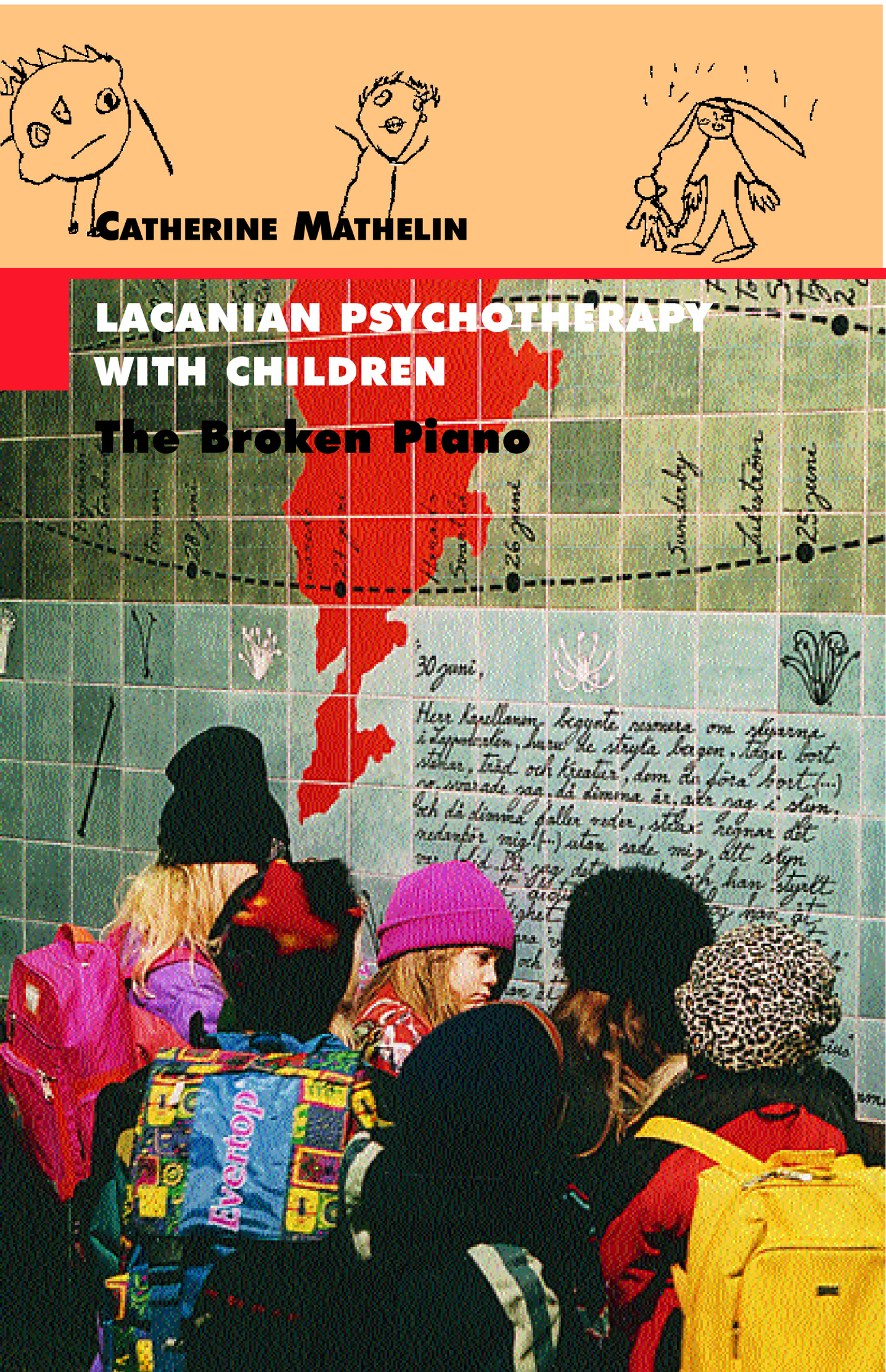
A series of books edited by Judith Feher-Gurewich in collaboration with Susan Fairfield
Introduction to the Reading of Lacan: The Unconscious Structured Like a Language
Jol Dor
Lacan and the New Wave in American Psychoanalysis: The Subject and the Self Judith Feher-Gurewich and Michel Tort, eds.
The Clinical Lacan
Jol Dor
Hysteria from Freud to Lacan: The Splendid Child of Psychoanalysis
Juan-David Nasio
Lacanian Psychotherapy with Children: The Broken Piano
Catherine Mathelin
Separation and Creativity: Refinding the Lost Language of Childhood
Maud Mannoni
What Does a Woman Want?
Serge Andr
Lacan in America
Jean-Michel Rabat, ed.
Lacan
Alain Vanier
Lacans Seminar on Anxiety: An Introduction
Roberto Harari, translated by Jane C. Lamb-Ruiz
Structure and Perversions
Jol Dor
Against Adaptation: Lacans Subversion of the Subject
Philippe Van Haute, translated by Paul Crowe and Miranda Vankerk
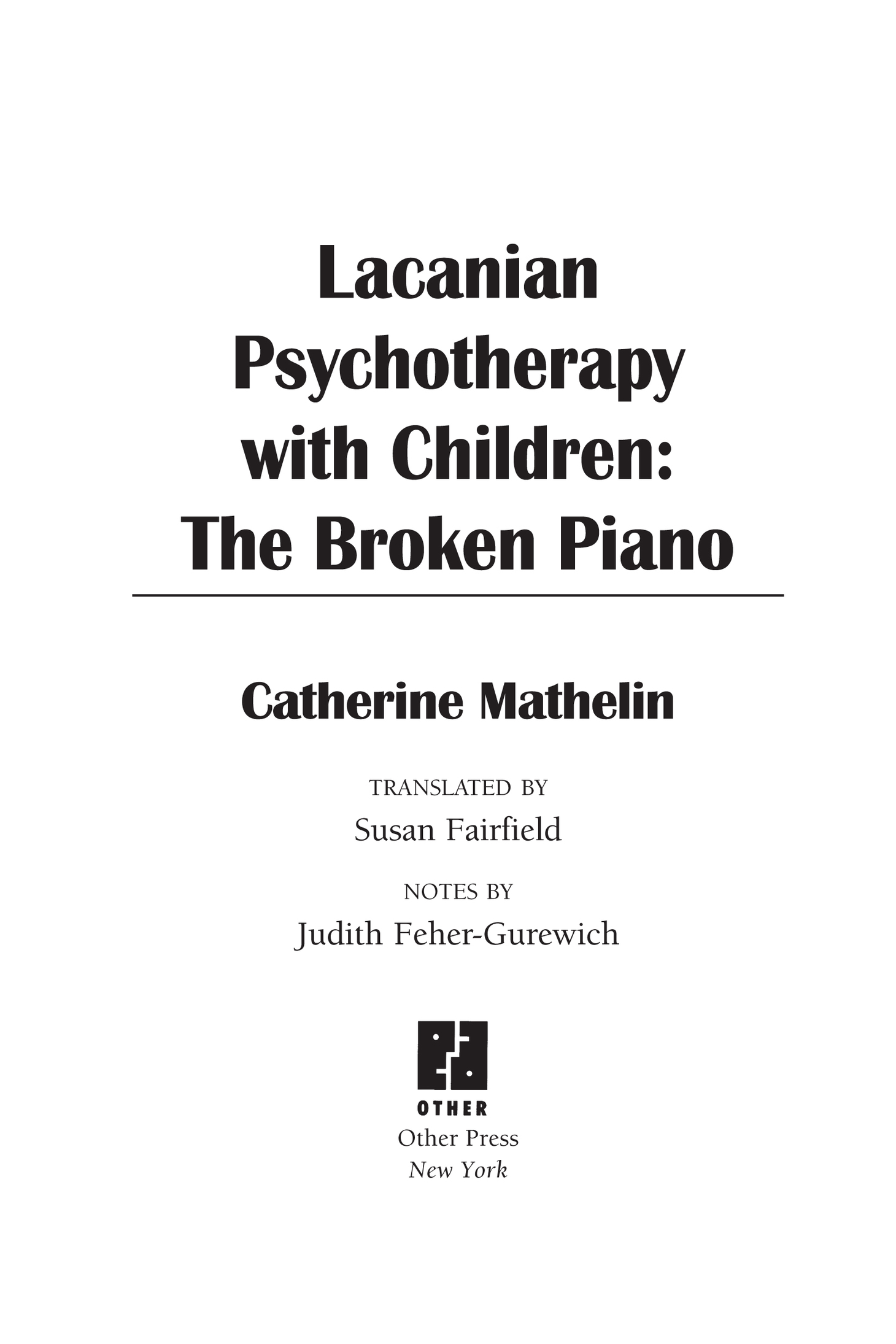
This work, published as part of the program of aid for publication, received support from the Ministry of Foreign Affairs of the Cultural Service of the French Embassy in the United States. Cet ouvrage publi dans le cadre du programme daide la publication bnficie du soutien du Ministre des Affaires Etrangres du Service Culturel de lAmbassade de France reprsent aux Etats-Unis.
Production Editor: Robert D. Hack
Copyright 1999 by The Other Press, LLC; 1994 by ditions DENOL.
Ebook ISBN9781635421118
All rights reserved, including the right to reproduce this book, or parts thereof, in any form, without written permission from Other Press, LLC except in the case of brief quotations in reviews for inclusion in a magazine, newspaper, or broadcast. For information write to Other Press LLC, 267 Fifth Avenue, 6th Floor, New York, NY 10016. Or visit our website: www.otherpress.com.
Library of Congress Cataloging-in-Publication Data
Mathelin, Catherine.
[Raisins verts et dents agaces. English]
Lacanian psychotherapy with children : the broken piano / Catherine Mathelin; translated by Susan Fairfield; noted by Judith Feher-Gurewich.
p. cm. (The Lacanian clinical field)
Includes bibliographical references and index.
ISBN 978-1-892746-01-6 (softcover : alk. paper)
1. Child analysisCase studies.2. Lacan, Jacques, 1901.
1. Title.II. Series.
RJ504.2.M39131999
618.928917DC2198-36956
a_prh_5.5.0_c0_r0
To milie and Mathieu
Above all I want to thank the children and their families who made this work possible. I am also grateful to:
Maud Mannoni, without whom this book could never have existed; Franoise Dolto, Rosine and Robert Lefort, and Solange Falad, whose teaching has had a special influence on my work over the past twenty years; Colette Misrahi, who kindly read the proofs and whose advice, analytic rigor, and friendship were, as always, of inestimable help; Alain Vanier, with whom I have worked for such a long time that he will once again recognize here the imprint of his seminar and of our colleagueship; Dominique and Patrick Guyomard and my fellow analysts from the Centre de formation et de recherches psychanalytiques (Center for Psychoananalytic Training and Research), all of whom I cannot name here but who shared with me the adventure of creating the Center and whose participation in groups, seminars, and workshops was of great help in the preparation of this book; and last but not least Myriam El Hefnaoui, who, thanks to her patience and her kind collaboration, managed to decipher my hieroglyphics.
Catherine Mathelin, 1994
Judith Feher-Gurewich
Steven L. Ablon, M.D.
Lacanian psychoanalysis exists, and the new series, The Lacanian Clinical Field, is here to prove it. The clinical expertise of French practitioners deeply influenced by the thought of Jacques Lacan has finally found a publishing home in the United States. Books that have been acclaimed in France, Italy, Spain, Greece, South America, and Japan for their clarity, didactic power, and clinical relevance will now be at the disposal of the American psychotherapeutic and academic communities. These books cover a range of topics, including theoretical introductions; clinical approaches to neurosis, perversion, and psychosis; child psychoanalysis; conceptualizations of femininity; psychoanalytic readings of American literature; and more. Thus far nine books are in preparation.
Though all these works are clinically relevant, they will also be of great interest to those American scholars who have taught and used Lacans theories for over a decade. What better opportunity for the academic world of literary criticism, philosophy, human sciences, womens studies, film studies, and multicultural studies finally to have access to the clinical insights of a theorist known primarily for his revolutionary vision of the formation of the human subject. Thus The Lacanian Clinical Field goes beyond introducing the American clinician to a different psychoanalytic outlook. It brings together two communities that have grown progressively estranged from each other. For indeed, the time when the Frankfurt School, Lionel Trilling, Erich Fromm, Herbert Marcuse, Philip Rieff, and others were fostering exchanges between the academic and the psychoanalytic communities is gone, and in the process psychoanalysis has lost some of its vibrancy.
The very limited success of ego psychology in bringing psychoanalysis into the domain of science has left psychoanalysis in need of a metapsychology that is able not only to withstand the pernicious challenges of psychopharmacology and psychiatry but also to accommodate the findings of cognitive and developmental psychology. Infant research has put many of Freuds insights into question, and the attempts to replace a one-body psychology with a more interpersonal or intersubjective approach have led to dissension within the psychoanalytic community. Many theorists are of the opinion that the road toward scientific legitimacy requires a certain allegiance with Freuds detractors, who are convinced that the unconscious and its sexual underpinnings are merely an aberration. Psychoanalysis continues to be practiced, however, and according to both patients and analysts the uncovering of unconscious motivations continues to provide a sense of relief. But while there has been a burgeoning of different psychoanalytic schools of thought since the desacralization of Freud, no theoretical agreement has been reached as to why such relief occurs.
Nowadays it can sometimes seem that Freud is read much more scrupulously by literary critics and social scientists than by psychoanalysts. This is not entirely a coincidence. While the psychoanalytic community is searching for a new metapsychology, the human sciences have acquired a level of theoretical sophistication and complexity that has enabled them to read Freud under a new lens. Structural linguistics and structural anthropology have transformed conventional appraisals of human subjectivity and have given Freuds unconscious a new status. Lacans teachings, along with the works of Foucault and Derrida, have been largely responsible for the explosion of new ideas that have enhanced the interdisciplinary movement pervasive in academia today.
Font size:
Interval:
Bookmark:
Similar books «Lacanian Psychotherapy With Children»
Look at similar books to Lacanian Psychotherapy With Children. We have selected literature similar in name and meaning in the hope of providing readers with more options to find new, interesting, not yet read works.
Discussion, reviews of the book Lacanian Psychotherapy With Children and just readers' own opinions. Leave your comments, write what you think about the work, its meaning or the main characters. Specify what exactly you liked and what you didn't like, and why you think so.

